New BYU–Idaho President Henry J. Eyring Follows in His Father’s Footsteps
Contributed By Marianne Holman Prescott, Church News staff writer
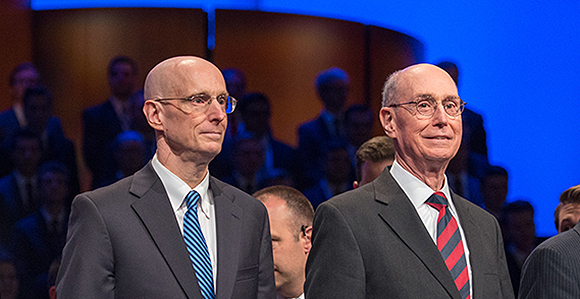
BYU–Idaho President Henry J. Eyring stands next to his father, President Henry B. Eyring of the First Presidency, during the BYU–Idaho inauguration on September 19.
Article Highlights
- President Henry J. Eyring was inaugurated as the 17th president of BYU–Idaho on September 19, 2017.
- President Henry B. Eyring counseled his son to put the Lord at the heart of his service.
- BYU–Idaho values teaching the individual by the power of the Holy Ghost.
“The great spirit of this place—its values, its character, its very nature—is in Henry’s heart and soul.” —Elder Kim B. Clark, General Authority Seventy
Related Links
REXBURG, IDAHO
On his 54th birthday on a windy Rexburg day, President Henry Johnson Eyring was inaugurated as the 17th president of Brigham Young University–Idaho.
In front of a near-capacity crowd in the BYU–Idaho Center on September 19, President Henry J. Eyring, son of President Henry B. Eyring of the First Presidency, stood in front of nearly 15,000 students and accepted a formal charge from his father to lead the university with the Lord’s help.
“These exercises are designed to mark the beginning of a new chapter in the history of Brigham Young University–Idaho,” President Henry B. Eyring said during the installation of the new president. “Today, on behalf of the board of trustees and the First Presidency of The Church of Jesus Christ of Latter-day Saints, I install you, Henry J. Eyring, as president of BYU–Idaho and confer upon you the authority, the rights, the responsibilities, and the challenges associated with this office.”
The inauguration brought many Church leaders to the campus. Elder Dallin H. Oaks of the Quorum of the Twelve Apostles conducted the event, and speakers included President Henry B. Eyring and Elder Kim B. Clark, General Authority Seventy and Commissioner of Church Education.
Like President Henry B. Eyring’s day of inauguration at Ricks College in 1971 where his father, Henry Eyring, offered remarks, so was the case for Henry J. Eyring as his father spoke to him.
“President Henry Johnson Eyring’s grandfather passed on to him, and to me, a sense of how great universities are built,” he said. “They are communities of people with an insatiable thirst to know what is true and what is good. They work so hard that their ears ring. … But it takes more than hard work and personal achievement to satisfy them. Those real builders of universities cannot fully enjoy their accomplishment until they help someone else learn as they have learned. … Those builders of great universities draw others around them as colleagues. They find joy in giving others confidence that they can do more than they thought that they could.”
No stranger to the Rexburg, Idaho, area, President Henry J. Eyring has been working at the university for the last decade in a variety of roles. He also spent much of his childhood “growing up” on the campus, as his father was the 10th president of Ricks College.
As is the custom for incoming presidents to receive a formal charge during the event, President Eyring encouraged his son to let the Lord guide him in his work as president of the university. He offered his son a six-part charge.
“First, you are to place the Lord Jesus Christ, whose school this is, at the heart of your service,” President Eyring said. “His purposes are to be yours, as nearly as you can discern them; His light, the beacons to guide your feet; and His love, your source of courage, confidence, and motivation.”
Second, President Eyring encouraged his son to serve and guide all who teach, lead, learn, and labor at the university by acknowledging and treating them as children of a loving Heavenly Father, with divine potential to become like Him.
Third, President Eyring charged his son to find ways to infuse the Spirit of God into the experiences of all who learn and serve at the university.
“The Spirit will be a key to their success in the strenuous effort they must make to learn and so rise to their potential,” President Eyring said.
Fourth, President Eyring told his son to take full advantage of the Lord’s promise that He will direct the path of His faithful servants.
“You must study and pray to know what you are to do,” he said. “You must counsel with others and study whatever facts you can gather. When you then pray and ask in faith, you may expect to receive inspiration.”
Fifth, President Eyring told his son to demonstrate and teach gratitude for those who have preceded him in the Lord’s work of building the university from its humble beginnings.
“They each gave enough and sacrificed enough to qualify for His pouring out blessings upon this school, both spiritual and temporal, … blessings beyond what they could foresee,” President Eyring said. “The Lord did not make growth easy for them, nor will He for you. He did not make destiny clear for them, but He revealed the next step as He inspired the taking of it. He went before their faces, and He will go before yours. Your charge is to preserve and increase gratitude to the Lord for this university and those who have served Him here.”
President Eyring told his son that he is “charged to exemplify in your life and family the gospel ideals of Christlike love and perfect fidelity. You are to treat your family members as your most precious treasure. You will, by placing them above all earthly achievements, inspire for good all who are blessed to come within the power of your example and influence.”
In response to the presidential charge from his father, President Henry J. Eyring spoke of the faithful leaders—beginning with his father—who have come before him and spoke of his plan to build upon what they already established.
“I have been blessed to know and be guided by each of these presidents, beginning with my father,” he said. “He and my mother, Kathleen, accepted the assignment to preside over Ricks College sight unseen.”
Walking listeners through the last seven presidents, President Henry J. Eyring recognized the blessings and progress made with each president.
“But we also face the challenge of retaining currently enrolled students, particularly our freshman,” President Henry J. Eyring said.
Recognizing the need to focus on “the one” in education by giving more attention than ever to potential “lost sheep,” President Henry J. Eyring spoke of innovative ways the university is responding to problems facing higher education today. A main goal of BYU–Idaho is providing a quality education to as many people at a lower cost. Also important to a BYU–Idaho education is an increased sensitivity to the Spirit’s guidance and gaining qualities of natural leadership.
“Thanks to prophetic direction and the financial support of the Church, we stand on higher ground,” President Henry J. Eyring said. “Through our integral association with BYU–Pathway Worldwide, we are blessed to be both a haven and a light to the world. We are similarly blessed as we minister to one another on this campus. May we honor our institutional birthright by building upon the providential preparations of the past and qualifying for heaven’s continuing direction.”
BYU–Idaho’s 15th president, Elder Kim B. Clark, joked about holding the inauguration on President Henry J. Eyring’s birthday.
“Who gets inaugurated on their birthday?” he said.
He spoke of the important place BYU–Idaho is and the blessings that come to those who attend the university.
“We can see it; we can see the hand of the Lord in His kingdom and in this school,” said Elder Clark. “BYU–Idaho has been created and set apart by the hand of the Lord through His living prophets. It has been set apart for His work and His purposes. It has been set apart from the world to be a different kind of university.”
Elder Clark said that at the heart of BYU–Idaho is “the heritage of Ricks College—an abiding commitment to students of diverse interests and abilities: to deep learning of mind, heart, body, and spirit; to teaching one-by-one by the power of the Holy Ghost; to lives of faith in Jesus Christ, love, sacrifice, humility, obedience, frugality, and hard work.”
Over the years the Lord has been able to work through “the remarkable people of BYU–Idaho,” Elder Clark said, and President Henry J. Eyring is no exception.
“The great spirit of this place—its values, its character, its very nature—is in Henry’s heart and soul,” he said. “There is a beautiful alignment between who Henry is and the very essence of this school. His roots here are deep.”
Many Church leaders and past college presidents attended the event, including Elder David A. Bednar and his wife, Sister Susan Bednar; Elder Dale G. Renlund and his wife, Sister Ruth Renlund; Elder Kim B. Clark and his wife, Sister Sue Clark; Elder Gerrit W. Gong and his wife, Sister Susan Gong; Elder Donald L. Hallstrom and his wife, Sister Diane Hallstrom; Bishop Gérald Caussé and his wife, Sister Valerie Caussé; Sister Jean B. Bingham and her husband, Brother Bruce Bingham; Sister Bonnie L. Oscarson and her husband, Brother Paul Oscarson; and Brother Stephen W. Owen and his wife, Sister Jane Owen.
Previous presidents of the college were in attendance—President Henry B. Eyring, Elder Bednar, Elder Clark, President Clark G. Gilbert, Elder Joe J. Christensen, Elder Bruce C. Hafen, and President Stephen Bennion.
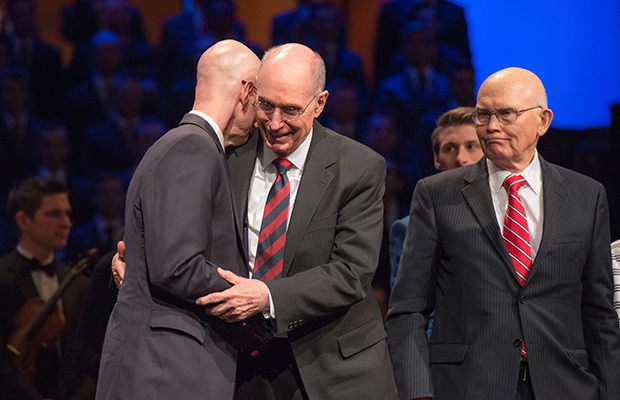
President Henry J. Eyring and President Henry B. Eyring during the BYU–Idaho inauguration on September 19. Photo by Michael Lewis.
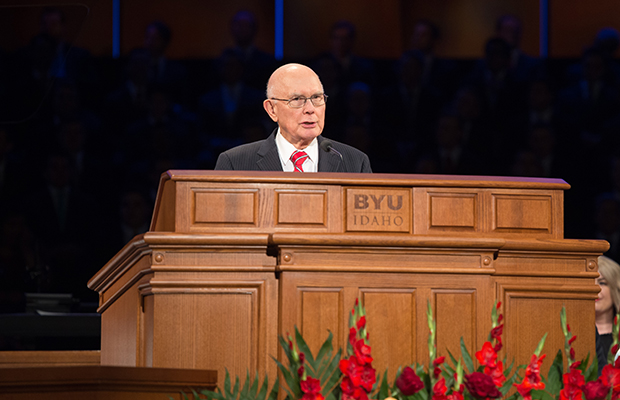
Elder Dallin H. Oaks speaks during the BYU–Idaho inauguration on September 19. Photo by Michael Lewis.
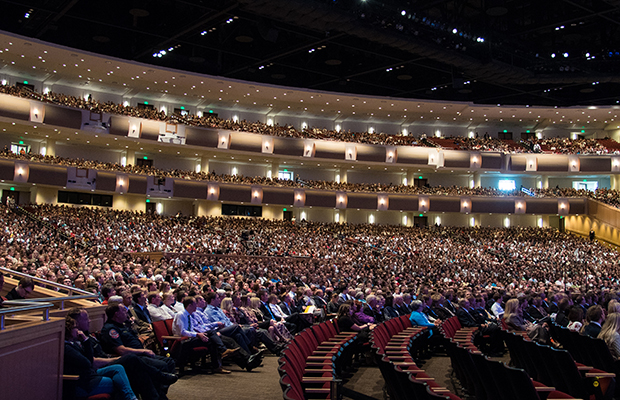
The BYU–Idaho Center is filled with students and community members for the Inauguration. Photo by Courtney Mitchell.
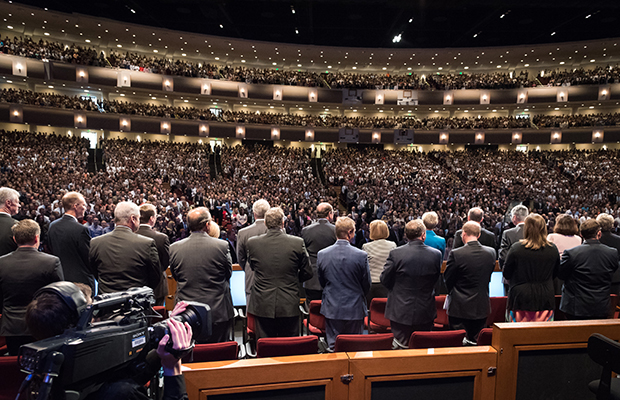
The presidential inauguration of Henry J. Eyring at BYU–Idaho. Photo by Garrett Blanchard.
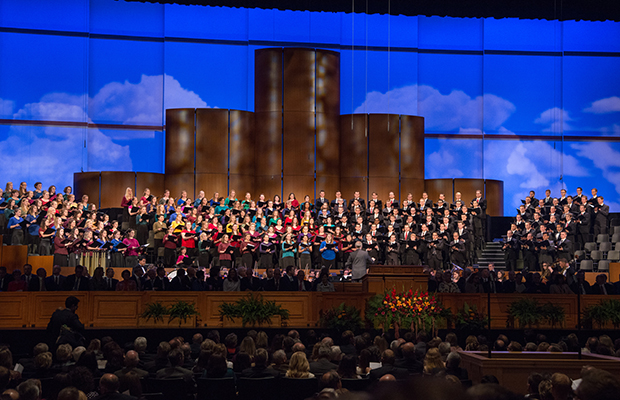
A choir performs during the inauguration of President Henry J. Eyring at BYU–Idaho on September 19. Photo by Michael Lewis.
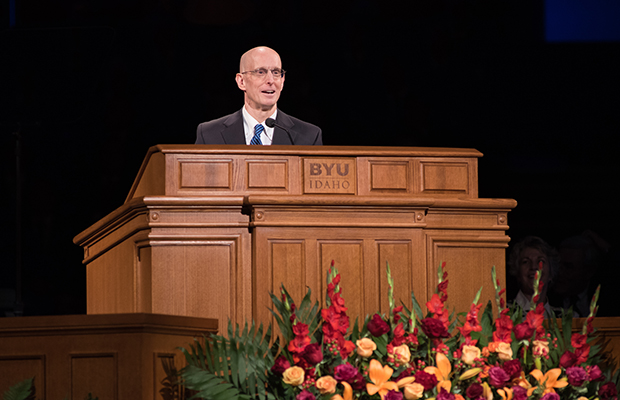
President Henry J. Eyring speaks at his inauguration. Photo by Courtney Mitchell.
